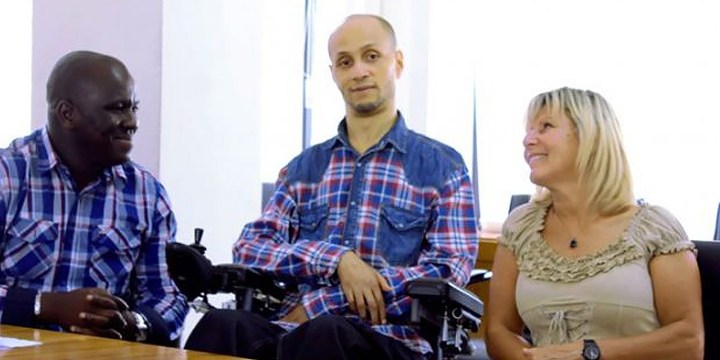IN MEMORIAM
Max Brito, the Ivorian who suffered a catastrophic injury at RWC 1995, dies at 54

While Francois Pienaar and the Springboks raised the Webb Ellis Cup in 1995, a 27-year-old Ivorian, Max Brito, lay paralysed in hospital. Brito died on Monday night.
After more than a quarter of a century in a wheelchair after a collapsed ruck left Ivory Coast wing Max Brito paralysed from the neck down, the 54-year-old passed away in France on 19 December.
His life after that fateful day in Rustenburg against Tonga at the Rugby World Cup (RWC) in 1995 changed dramatically. Brito was 27 when, buried under a pile of bodies after being tackled, two vertebrae were crushed. He spent much of the ensuing years fighting depression.
After finding some joy in the latter part of his life, Brito died late on Monday night in the company of his sons Mike and Anthony and friends.
“The Brito family, his children Mike and Anthony, sadly announce the death of Max Brito, on Monday December 19 at 18:30 (17:30 GMT),” read the family statement on the website of French club, Biscarrosse Olympique Rugby.
“Max went on his last voyage with dignity and without suffering.”
Depression and anger
Even though Brito underwent numerous operations after the accident, he retained only limited mobility of his head, upper body and arms.
His wife left him and, in an interview with French publication Le Monde in 2007, Brito’s anguish and desperation were revealed.
“It is now 12 years since I have been in this state. I have come to the end of my tether,” Brito told Le Monde.
“If one day I fall seriously ill, and if I have the strength and courage to take my own life, then I will do it. This bloody handicap. It’s my curse. It kills me and I will never accept it. I can’t live with it and it’s going to be with me for the rest of my life.”
But he did find some peace and came to accept his condition after finding what he described as “spiritual enlightenment”.
News of Brito’s death was a reminder of the dangers of rugby and that while 1995 was a triumph for the Springboks and South Africa, it will always be tinged with sadness.
Visit Daily Maverick’s home page for more news, analysis and investigations
“It’s a stark reminder that rugby is a beautiful game, but it is also a brutal game,” Bok 1995 winning flyhalf Joel Stransky told Daily Maverick.
“To hear that Max passed away is tragic and sad. But I suppose it also showed his great courage to survive and live for so long and eventually find some peace. It couldn’t have been easy.
“As the Springboks, we heard and read about it at the time and knew that Max had suffered a catastrophic injury. We felt some sadness and I recall sitting back and counting my blessings. It’s only human nature to feel a little grateful that it’s not you or one of your teammates, but you can’t dwell on it.
“Every part of life has its casualties, and you can’t change it, or change how you go about things. You have to get on with it.
“It reminds you again to be grateful because, as I sit here now and think back to all the matches, training sessions, and minor and not so minor injuries I suffered, I was lucky.
“It’s also a reminder of all the people we have lost since 1995. Doddie Weir (Scotland) passed away a few weeks ago, and we have also lost Joost van der Westhuizen, Ruben Kruger, Chester Williams and James Small since then.”
Stransky, who does some work for the Chris Burger Petro Jackson Players’ Fund, which supports rugby players with serious injuries, believes that the stricter laws which protect the game today are necessary and are working.
“Trying to make rugby safer is vital for two reasons – one is for the financial stability of its future because of potential lawsuits. But most importantly, it’s for the safety of the players.
“If you want the game to continue and blossom and to grow, and for the kids of today to be the stars of tomorrow, the game has to be safer.
“It’s not just Max … sadly, there have been several serious injuries at all levels of the game. But studies are showing that statistically rugby is a safer game now than it was 10 years ago because of the attempts to make it safer.” DM



















Comments - Please login in order to comment.